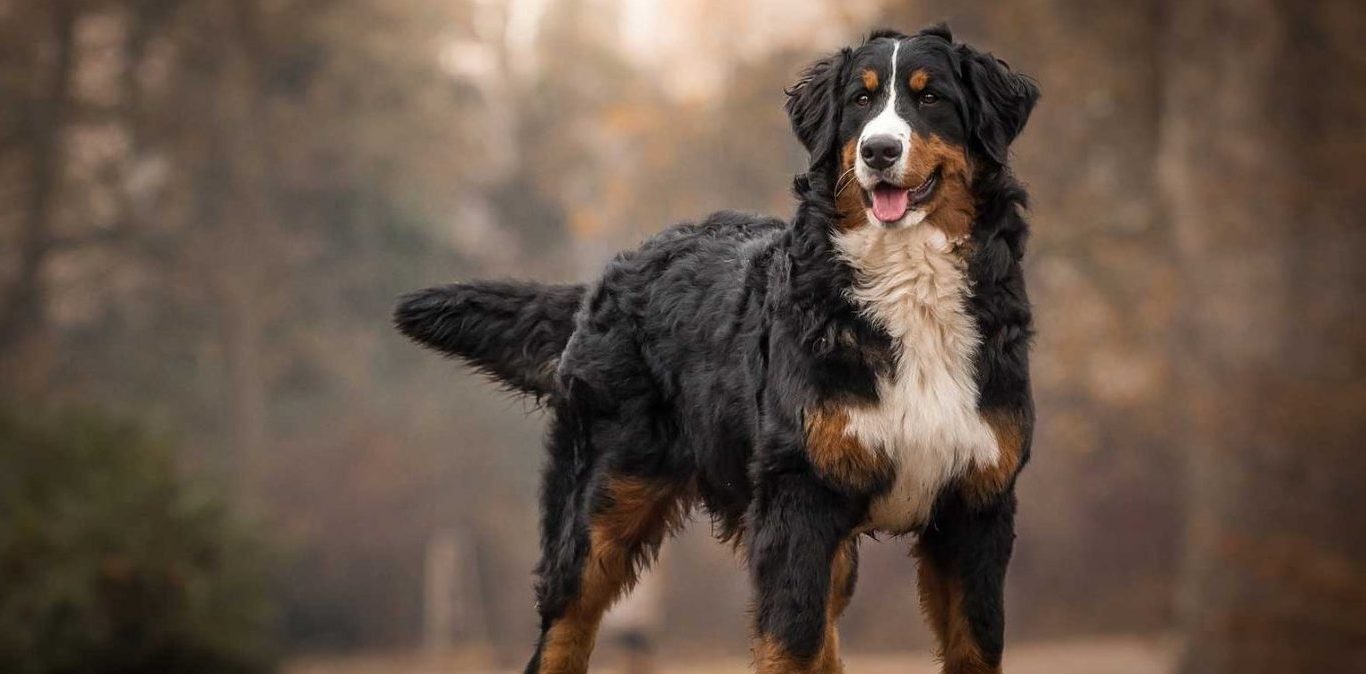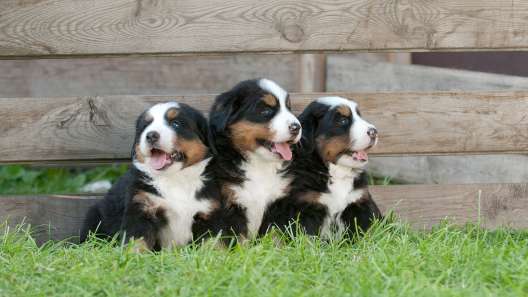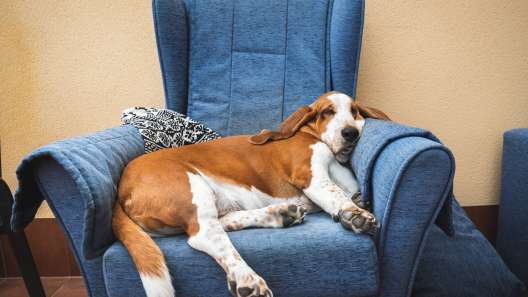-
Activity Level:
moderate
-
Shedding Level:
moderate
-
Grooming Level:
moderate
-
Trainability:
high
-
Good for Novice Owners:
high
-
Adaptability:
moderate
-
Kid/Pet Friendly:
often
-
Prey Drive:
high
-
Watchdog:
aware
- Average Size: Large
- Average Lifespan: 7-10 years
- Registered?: aca, akc
Bernese Mountain Dog Dog Breed Information
Overview
Temperament
Adaptability
Health
Owner Experience
Grooming
Activity Level
Size
Life Span
Did You Know?
The beautiful and majestic Bernese Mountain Dog is a versatile and intelligent working breed from the mountains of Switzerland. They are one of the four mountain dog breeds from the canton of Bern, which refers to a large agricultural region dedicated to the dairy production needed for exports of Swiss chocolate and cheese.
One of the facts about Bernese Mountain Dogs is that they were originally farm dogs. “The Berner” was bred to be an all-purpose farm dog that was able to herd livestock, stand guard over the farm, pull carts of produce to market, and still have the capacity to be a loving companion to their family.
Breed numbers were dwindling by the late 1800s and the quality of the dogs left was decreasing as well. Professor Albert Heim, one of the most respected, if not the most respected, European dog men of his generation, started a Swiss breed club in 1907 to revive the breed. It didn’t take long for the Berner to reclaim their spot as a favored farm dog and also as a popular household companion.
A Kansas farmer is credited with bringing a pair of Berners to the United States in 1926. From there, they quickly caught on with other U.S. farmers and with people looking for a large, friendly family companion. The American Kennel Club recognized the Bernese Mountain Dog as a member of the Working Group in 1937.
In addition to being beloved family companions, they can still be found working as all-around farm dogs, search-and-rescue dogs, therapy dogs, and more. They are also considered one of the dog breeds that make the best service dogs.
Bernese Mountain Dogs are like big, affectionate teddy bears. They tend to love attention and affection, especially from their favorite humans. A well-socialized Berner has a calm and sweet demeanor and tends to get along fantastically with children, other dogs, and even strangers once introduced. They are even considered one of the great dog breeds for large families because of how well they tend to fit in and enjoy the company.
Berners are known as one of the kid-friendly dog breeds, but they can have a high prey drive when it comes to small animals. They are generally fine with small animals they have been socialized within the family, especially if they were raised around them. But, they may still have the urge to chase small animals that are not part of their pack.
Berners are moderately adaptable dogs. They tend to be better suited to larger homes with fenced yards where they can run. But, as long as the living area is big enough and they get enough daily exercise, attention, and mental stimulation, they can adapt well to apartment living.
Bernese Mountain Dogs are very sensitive to heat. As one of the dog breeds that love winter, they tend to thrive in the cold. They may not make a den and nap in the snow like Malamutes or Huskies, but they will certainly enjoy the cooler weather and a roll in the snow.
These dogs bond closely with their families and thrive on attention and affection from them. Because of this, they do not like to spend long periods of time alone. If left alone for too long, they can become anxious and destructive.
Potential health concerns to be aware of in Bernese Mountain Dogs can include hip dysplasia, elbow dysplasia, von Willebrand’s Disease, progressive retinal atrophy, blood disorders, and some cancers. Good breeding practices make a big difference in the health of Bernese Mountain Dog puppies.
Reputable breeders will screen their dogs to avoid passing preventable issues to puppies. Make sure you ask the breeder about the health and genetic history of both parents. You can also ask about any health tests or clearances that have been done. Transparency, a willingness to answer questions, experience with and knowledge about the breed, and more are all qualities to look for in a great breeder.
The Bernese Mountain Dog Club of America (BMDCA) recommends an AKC DNA profile, a cardiac evaluation, Degenerative Myelopathy (DM) DNA tests, an elbow evaluation, a hip evaluation, and an ophthalmologist evaluation at a minimum. Optional tests to consider can include a von Willebrand’s Disease (vWD) DNA test, a Histiocytic Sarcoma risk test, and a thyroid exam.
As a large dog breed, the Bernese Mountain Dog is at risk for bloat. Bloat in dogs can be dangerous and can quickly become fatal if the stomach flips (i.e., gastric torsion occurs). It’s important to know how to reduce the risk and what symptoms to look for so you know when to get help.
An intelligent dog that picks up on things quickly and is eager to please, the Bernese Mountain dog is a good fit for owners of all experience levels. They are even considered one of the best dog breeds for first-time owners.
Berners are sensitive to tone of voice and are in tune with their owners. They respond best to consistent training with positive praise and reward. They also tend to excel at learning various commands and can even learn to respond to hand signals as well as verbal commands.
Bernese Mountain Dogs are one of the fluffiest dog breeds. They have a thick, moderately-long double coat. They are known for their tricolor coat which is a mix of black, white, and rust. Although they share this tricolor coloring with the other three Swiss Mountain Dogs, they are the only one of the four with a long, silky coat.
These dogs will shed moderately year-round and heavily during seasonal shedding. Brushing a few times a week is recommended with daily brushing recommended during seasonal shedding sessions. A slicker brush, metal comb, and undercoat rake are good types of dog grooming brushes to have on hand for this dog breed. Bathing and visits to the groomer are on an as-needed basis.
In addition to coat care, you will also need to take care of your Bernese Mountain Dog’s nails, ears, and teeth. Cutting nails once or twice a month is usually enough to keep them from growing too long. Weekly ear checks and careful cleanings as needed can help prevent ear infections. Daily dental care for dogs, plus cleanings at the vet when needed, helps prevent painful dental diseases later in life.
Although they are working dogs and are known to excel at several popular dog sports, Bernese Mountain Dogs tend to sit in a low to moderate activity range. They are more than happy to get up and be active with you and will likely always be up for spending time being active together.
Even though they are considered one of the sturdy dog breeds for outdoor adventures and will play hard when they are playful, they tend to overheat easily. They don’t necessarily need a lot of exercise to be happy and healthy, but they’re often up for it if you are and it’s not too hot outside.
Daily walks plus some playtime and some other activity are usually enough for this dog breed as long as they have a job to do. They can be an intense and playful breed and will play hard until they are tired, but they can also be one of the laziest dog breeds if you let them. Berners are known to match their energy level to yours.
Fully-grown Bernese Mountain Dogs usually stand 23-28 inches tall and weigh 70-115 pounds. Although they are not the biggest in the bunch, Berners still grow to be one of the largest dog breeds in the world.
Berners generally live for 7-10 years on average.
Roman soldiers invading Switzerland over two thousand years ago are credited with bringing the ancestors of the Bernese Mountain Dog into the region.









